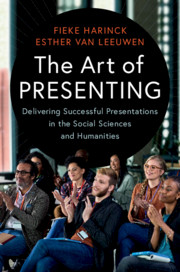Introduction
Published online by Cambridge University Press: 15 August 2020
Summary
To all the aspiring, practising, procrastinating, fearful, curious, experienced, novice, hopeless, and hopeful presenters in the social sciences, humanities, and related fields: welcome to this book on how to deliver an oral presentation of your scientific work. Delivering professional presentations of scientific research and ideas is an important and invaluable part of an academic’s life. As academics, we need to share our work with our academic peers, and oftentimes also with those outside academia. We do this both in written form (such as papers, books, chapters, and theses) and in the form of oral presentations. In a society in which information is exchanged at an ever increasing speed, oral communication is steadily winning terrain over the slower written forms of communication, which often take months or even years to disseminate. But oral presentations are not only becoming more commonplace because they are fast and easy ways to share information, they are also becoming a vital tool for self-presentation. With the growing competition in academia, the difference between obtaining a desired position or grant and ending second can lie in the personal impression you make on those that make the decision. Oral presentations have become an intricate part of job and grant applications, and serve not only to present your scientific work, but also to present yourself. As such, oral presentations have become an academic’s calling card.
- Type
- Chapter
- Information
- The Art of PresentingDelivering Successful Presentations in the Social Sciences and Humanities, pp. 1 - 4Publisher: Cambridge University PressPrint publication year: 2020



